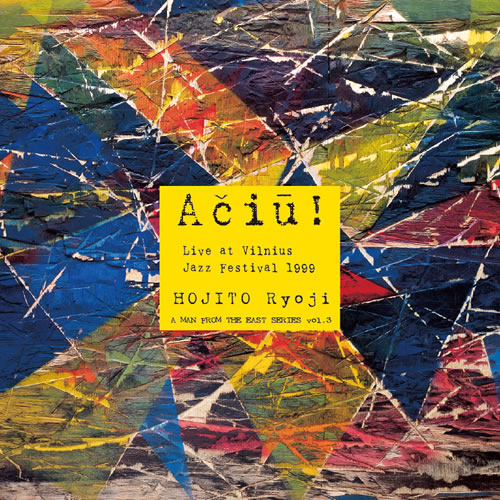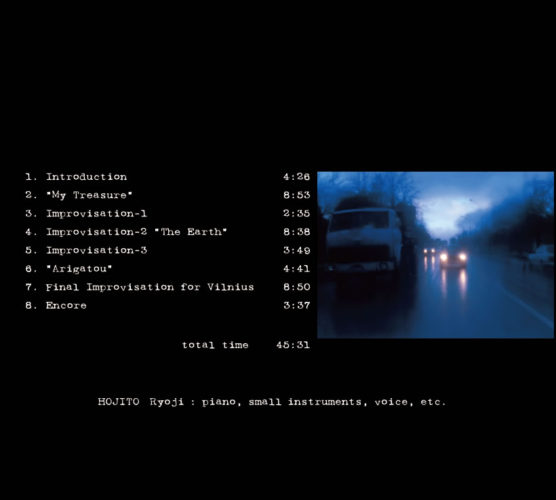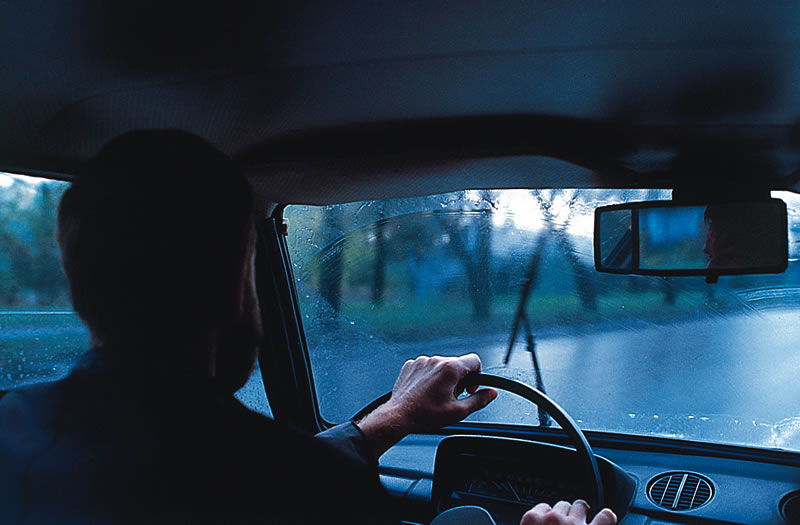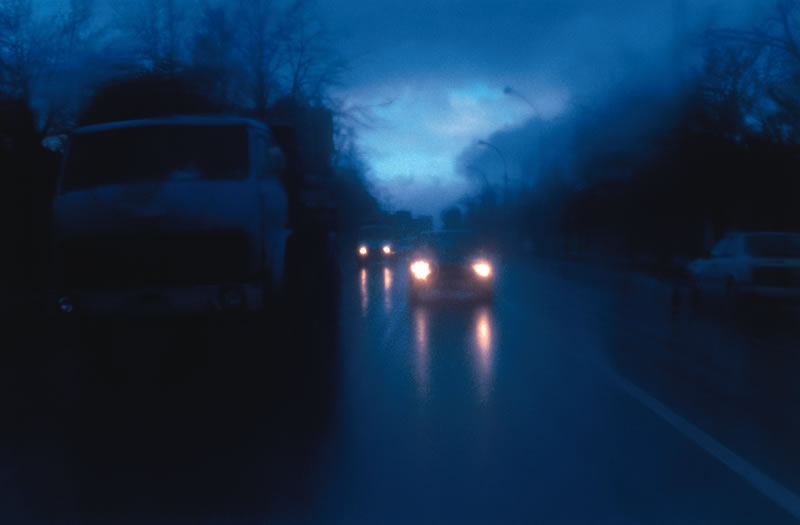darko: dkcd03
Aciu!: Live at Vilnius Jazz Festival 1999
A Man from the East Series, Vol. 3
01 Introduction (4:26)
02 My Treasure (8:53)
03 Improvisation-1 (2:35)
04 Improvisation-2: The Earth (8:38)
05 Improvisation-3 (3:49)
06 Arigatou (4:41)
07 Final Improvisation for Vilnius (8:50)
08 Encore (3:37)
All music composed and performed by Ryoji Hojito
Ryoji Hojito: piano, small instruments, voice, etc.
Recorded live by Masami Suzuki at the Vilnius Jazz Festival on October 10, 1999
Sound improvements and mastering by Yoshihiro Tsukahara in Sapporo, January-March 2000
Cover painting: Akira Asahi
Photography: Takashi Homma
Design: Takashi Homma
Includes liner notes by Masami Suzuki in Japanese and English (English translation: Cathy Fishman and Yoshiyuki Suzuki)
レーベル:darko(ダーコ)規格番号:dkcd03
Released July, 2000
CD通販:Callithump
Masami Suzuki
(Russian literature scholar)
The people who come to the performance can enter this world themselves, and live in it as characters in the story. At the Vilnius Jazz Festival performance recorded on this CD, the audience was completely absorbed in Hojito Ryoji’s story; I know because I saw it with my own eyes and felt it with my whole body. It was as if the entire room had become one living thing, attaining a state of pure happiness. The digital camera set for instant recording (as the DAT being used was in poor condition) no doubt resonated with this happiness. Even the heartbeat of the camera’s internal motor accelerated, so this sound was also preserved for the record. Listening to this CD, you will surely resonate with the sound as well. You will feel that you have become a camera, seeing the performance in minute detail.
When I started to talk about Hojito’s music I ended up telling a fairy tale, and I think the reason has to do with the roots of improvised music. It is said that in ancient times, the sermons chanted by novice ascetic monks became the spirits of chants, flowing through the air and eventually dissolving into it; and that even after thousands of years they still exist, floating in the atmosphere. If true music comes from somewhere, then when we ourselves become mediums who catch these chants and chant-spirits and express them with our own bodies and voices, the result is improvised music. The piano is an extension of the musician’s body–just as the voice is. Issunboshi, rampaging inside the demon’s stomach, becomes one with the demon and mallet, and the lovely princess, and produces improvised music. Since the birth of life on Earth, the primitive music of various voices, sounds, and chant-spirits have filled the Earth’s atmosphere, waiting for the day when they become sounds that can be heard by human ears. But for the very reason that these sounds are complete strangers to Hojito, his music is made more vital by mistakes and chance. Simply becoming aware of the sounds would instantly turn improvised music into something commonplace. Changing the cluster of chaotic sound into the cosmos requires the body itself, transcending consciousness. Hojito’s improvised music is inside Hojito; and it is also his attempt to make a part of his being the innumerable musics existing in the air all around him. The attempt is transformed into visible motion, and the movement of the body itself can be heard and seen by the eye as wonderful music. The music of the cosmos, which ranges from the tracks of elementary particles to the movement of the heavenly bodies, on stage becomes Hojito’s body, and thus becomes reality.
February 14, 2000
English translation by Cathy Fishman and Yoshiyuki Suzuki
鈴木正美(ロシア文学者)
初めて宝示戸亮二の演奏に接した時の印象は「まるで一寸法師みたいだな」というものだった。なにしろ一寸法師の相手ときたら並みのプロレスラーより大きく、体重も数百kgある黒鬼で、88本もある牙をむき出してピアノ奏者に挑んでくるのだ。しかも243本もある弦のおのおのには100kgの張力がかかっているから、黒鬼全体で20トン以上の巨大パワーを持っている怪物だ。これに立ち向かう宝示戸は針の刀ならぬ素手とオモチャ、ガラクタたちを武器に鬼の外から攻め立て、やがて口の中へ飛び込み、お腹の中で暴れまわる。黒鬼はたまったものではなく、呻き、噎び、泣き、叫び、喚き、笑い、よじり、ねじり、めぐり、ひっくり返り、こけつ転び、はずれ、はじけ、次々と声を上げる。二人の闘いを観ている観客たちは胴間声しか出さないものと思っていた黒鬼が、こんなにも表情豊かな声の持ち主だったのか と驚愕する。しかも一寸法師自身の気合やつぶやき、歌声までこれに重なるのだ。やがて降参した黒鬼は打出の小槌を差し出す。すると一寸法師は突然うるわしく心優しいお姫様となって小槌を振りながら美しい声で歌い出す。単純なメロディーの繰り返し。それは子守歌のように懐かしく、せつない。一寸法師は大きくなったり小さくなったりしながら、闘いの緊張と子守歌の安寧という二つの世界を同時に、そして自在に生きている。宝示戸亮二とはそんな物語世界なのだ。
彼の演奏の場に関わる観客たちもこの物語世界の中で自らも登場人物として生きていくことができるのだ。今回のこのCDの舞台となったヴィリニュス・ジャズ祭で聴衆が宝示戸の物語にどっぷり浸っている様子を私自身この目で見、全身で感じたのだから、間違いない。あの時は会場全体が一つの生き物と化したかのように、生の喜びに満ちていた。録音のために用意していたDATが故障したため、急きょ録音専用となったデジタル・カメラも、その喜びに共鳴したのだろう。心臓部であるモーターの鼓動まで高まり、結果としてこの音までが記録に残されることになった 。このCDを聴く人はきっとこの音にも共鳴するはずだ。あなた自身がカメラとなってこの時のステ-ジをつぶさに見ていると感じることだろう。
宝示戸の音楽について語ろうとした時になんとなくおとぎ話になってしまったのは、即興音楽というものの根元に関わっているせいだと思うのだ。こんな話がある。古代の修行僧たちが唱えた真言が、言霊となって宙を飛び交い、やがて宙に融け、それは何百年何千年たってもどこかに存在し、宙を浮遊しているのだと。本当の音楽がどこかからやって来るものだとしたら、こうした真言(声)や言霊たちを私たち自身が霊媒となってキャッチし、それを自身の声や身体で表現する時、それが即興音楽になるのだろう。ピアノという楽器も身体の延長であり、奏者の声や身体と同じものなのだ。鬼のお腹の中で暴れまわる一寸法師は、鬼や打出の小槌、うるわしき姫とすべて一体になり、即興音楽を生み出す。地球上で生命の営みが始まって 以来、地球を取り巻く大気にはさまざまな声、音、言霊たちの原音楽があふれている。それらは人々の耳に聞こえる形になる日を待ち望んでいるのだろう。それらが宝示戸にとってまったく未知のものであるからこそ、間違いや偶然性が即興音楽をより生き生きとさせてくれる。単純に意識化するだけでは即興音楽はすぐに陳腐なものになってしまう。カオスのような音の群れをコスモスに変えるのには、意識を超えた身体そのものが要求される。宝示戸の即興音楽は自身のうちにもあり、また 自身を取り巻く宇宙に無数に存在する音楽たちを自ら身体化しようとする行為なのだ。行為は目に見える運動となり、身体の動きさえもすばらしい音楽として目に聞こえ、見えてくる。素粒子の軌跡から天体の運行に至る宇宙の音楽は、ステージの上で宝示戸の身体となって実現するのである。
2000年2月14日



